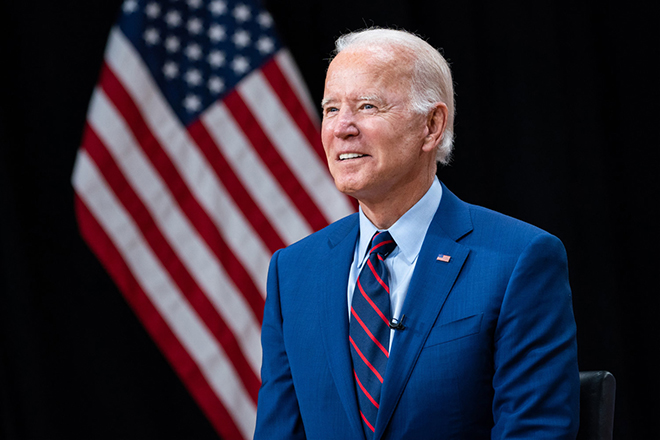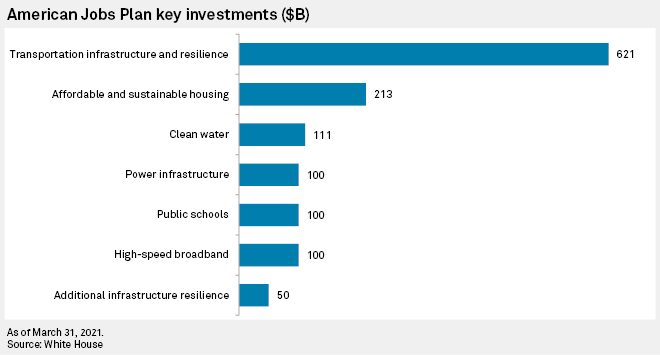Biden's $2 Trillion Infrastructure Plan Aims to Reenergize US Power Grid

By Molly Christian, Ellie Potter and Zack Hale
April 1, 2021 - The White House on March 31 released the outline of a jobs and infrastructure plan that calls on Congress to invest $100 billion to "reenergize America's power infrastructure."
The 10-year, $2 trillion American Jobs Plan also seeks to upgrade roads, bridges and water systems and help make U.S. infrastructure more resilient to the impacts of climate change.

President Joe Biden released details of a $2 trillion infrastructure plan on March 31 that includes efforts to modernize and cut emissions from the power sector.
Source: White House
Noting that the U.S. is still struggling economically from the coronavirus and ranks 13th in the quality of its infrastructure despite being the wealthiest country in the world, the White House said "it has never been more important for us to invest in strengthening our infrastructure and competitiveness, and in creating the good-paying, union jobs of the future."
The White House will need to work with Congress to draft comprehensive legislation to realize President Joe Biden's infrastructure vision. But finding ways to fund the plan and gain sufficient support in Congress could be challenging with Democrats holding only thin majorities in both chambers.
Power Grid
Along with repairing other infrastructure, the plan calls for the modernization of the country's aging electric grid, which Biden wants to produce 100% carbon-free electricity by 2035.
The plan proposes $100 billion in spending on upgrading and building out the nation's aging and regionally siloed electric transmission system. Various studies have estimated the U.S. will need to double or even triple its electric transmission capacity to successfully decarbonize its economy by midcentury.
The proposal would "put hundreds of thousands of people to work laying thousands of miles of transmission lines," according to a White House fact sheet. To that end, the plan would establish a new Grid Deployment Authority within the U.S. Department of Energy to leverage existing rights-of-way for transmission lines along roads and railways. The new office would also support "creative financing tools to spur additional high priority, high-voltage transmission lines."

In terms of related legislation, Rob Gramlich, executive director of Americans for a Clean Energy Grid, said a bill introduced last week by Sen. Martin Heinrich, D-N.M., to establish a tax credit for the installation of "regionally significant" transmission lines may be part of the legislative package.
"There's an opportunity to go really big and look at the needs of a $100 billion-plus macro grid but there's also an opportunity to focus on near-term deployment, and that's what the transmission tax credit would do," Gramlich said in an interview.
Gramlich said his firm has calculated that nearly two dozen large-scale interregional projects around the country, representing approximately 20 GW of transmission capacity, have stalled due to a lack of financing. "They're most of the way through the permitting process, so they really could get going soon," Gramlich said.
Clean Energy, Jobs and Fossil Fuels
Biden has also proposed to extend for 10 years an expanded direct-pay investment tax credit and production tax credit for clean energy generation and storage and establish an "energy efficiency and clean electricity standard" aimed at cutting power bills and pollution.
During a March 30 background briefing on the infrastructure plan, a senior administration official said Biden would work with Congress to form a national clean energy standard. Several lawmakers in Congress have already introduced bills to create such standards, some of which align with Biden's 2035 carbon-free power goal.
The White House's infrastructure plan also asks Congress to provide $35 billion to develop technology to address climate change and develop clean energy resources. The research provisions include Biden's previously announced intention to launch an Advanced Research Projects Agency focused on climate change, or ARPA-C.
The plan would also establish grant and incentive programs for state and local governments and the private sector to work toward Biden's goal of building a national network of 500,000 electric vehicle charging stations by 2030. Biden proposed a $174 billion investment to "win the EV market" by helping U.S. automakers expand the domestic supply chain "from raw materials to parts" and retool factories to make EVs and their components.
Biden's proposal would also allocate $16 billion to creating jobs plugging orphan oil and gas wells and reclaiming abandoned coal, hard rock, and uranium mines across the nation.
"In addition to creating good jobs in hard-hit communities, this investment will reduce the methane and brine that leaks from these wells, just as we invest in reducing leaks from other sources like aging pipes and distribution systems," according to the fact sheet.
"President Biden's Build Back Better plan is an environmental and climate initiative, too," said Lauren Pagel, Earthworks policy director. " But the $16 billion proposed must only be a down payment. We need a comprehensive plan, with comprehensive funding, to manage the decline of fossil fuels and strengthen our outdated mining safeguards."
Biden is also seeking to bring new industries to distressed communities. His plan proposes to pair an investment in 15 "decarbonized hydrogen demonstration projects" in distressed communities with a new production tax credit. His plan would also fund 10 pioneer projects to retrofit industrial facilities with carbon capture technologies "while ensuring that overburdened communities are protected from increases in cumulative pollution."
The proposal would amend the 45Q tax credit, allowing carbon capture developers to receive the credit through a direct-pay option and making it more accessible for direct air capture projects and retrofits at existing power generators.
Additionally, the plan would provide $15 billion for demonstration projects, including advanced nuclear, carbon capture, hydrogen, floating offshore wind turbines, and rare earth element separation technologies. Biden's proposal also includes $46 billion to manufacture clean energy technologies, including advanced nuclear reactors and electric vehicle charging infrastructure.
Rich Nolan, president and CEO of the National Mining Association, noted that "any infrastructure push aimed at bringing stability and growth to our economy and strengthening our supply chains would be well served to ensure those efforts are supplied with American-mined materials."
"If policymakers want to create high-paying jobs and support economic security while reshoring the nation’s industrial base, made-in-America infrastructure should begin with American mining," Nolan said.
Other major components of Biden's plan include $50 billion to improve infrastructure resilience as major climate and extreme weather events take their toll on roads, buildings and other systems. The proposal also repeated Biden's target to have 40% of the government's climate and clean infrastructure investments go to disadvantaged communities.
Funding, Political Outlook
Biden's climate and clean energy ambitions align with those of many Democrats in Congress, but getting GOP support could be tough.
The White House is coupling its American Jobs Plan with tax reforms aimed at offsetting the full cost of the infrastructure plan over 15 years. Those tax reforms include increasing the corporate tax rate to 28%, from the 21% level enacted in 2017 under former President Donald Trump and a GOP-controlled Congress.
But during the March 30 background call, the senior administration official said Biden "wants to understand if people have other ideas ... of how to pay for it."
The U.S. Chamber of Commerce applauded the Biden administration for making infrastructure a top priority but said the White House's proposal was "dangerously misguided when it comes to how to pay for infrastructure."
The chamber opposed the general tax increases proposed by the administration, saying they would slow down the country's economic recovery and make the U.S. less competitive globally. "The hard work of achieving bipartisan consensus is the best and only realistic path to enactment of historic infrastructure legislation," the group said.

